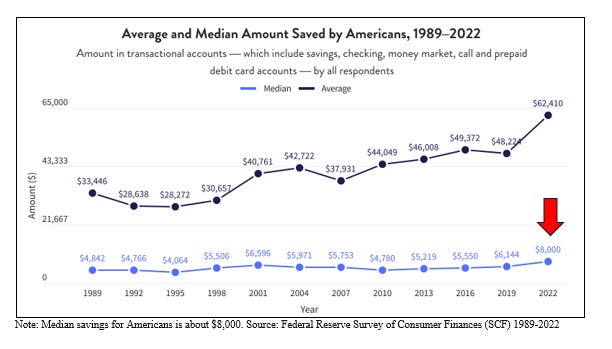Is The New Broker Fee Act Bad for Landlords?
Good intentions and myopic policy are not good bed fellows
Sometimes, there are unintended consequences for things.
Barreling down a hill on a bike and hitting the front-wheel brakes to stop
Arriving to the airport 30 mins before my international flight
Regulating broker fees to make renting easier in NYC
Council member Chi Ossé wants to do the right thing and make renting in New York easier for tenants than it currently is. Renters who seek apartments in NYC usually have to pay broker fees. These can be as high as 15% of the year's rent or as low as one month's rent on the apartment. These fees can increase move-in costs for tenants by 30-50%. That relative increase is significant enough to deter move-outs, and clearly, tenants have complained (side note: if the cost goes down, does that mean getting vacancies becomes easier? food for thought). In response to complaints, Ossé’s “Fairness in Apartment Rental Expenses Act” wants to make it illegal for tenants seeking an apartment to pay a broker fee unless they specifically hire the services of a broker – and his bill is here.
The line of thinking is that tenants don't always understand the fees they have to pay, and they don't enjoy paying brokers that don't add value to their rental experience. The legislation would cure this issue by placing the burden of paying the broker on the party that hired the broker. In most cases, that would transfer the responsibility for paying brokers to the landlord. Renters will opt out of hiring brokers to find housing. Unless landlords rent units themselves, that would mean landlords paying more for broker fees than before.
Renters are disgruntled because moving apartments requires too a lot of cash at one time. American men earned a median salary of $52,616 in 2022. The median value of American savings accounts was only $8,000 during the same period. That's less than 1/6th of the annual salary saved up, or 2/12ths. For these Americans, making a cash outlay equivalent to two months of salary exhausts their savings accounts. NYC is not the U.S. at large, but it's hard not to question the financial solvency of many New Yorkers, what with Buy Now Pay Later (BNPL), growing consumer credit card debt, and studies like these that propagate the idea that many adults live paycheck to paycheck. N.Y. renters face real challenges when forking over the bulk of their savings to secure an apartment, which is the norm today.

In theory, forcing landlords to cover the fee is not a problem, but they will need to recoup the costs elsewhere. That means reduced maintenance or higher rents to offset the month of rent (or more) being lost to broker fees whenever tenants move. Raising prices or lowering services offered is a normal response to higher operating costs. During the pandemic, when cooking ingredients increased, restaurants were quick to charge customers more for food and drinks, in some cases explicitly applying COVID-19 fees on to bills.
Instead of viewing this as a zero-sum game where one side wins and the other loses, owners and tenants should seek to align their interests. Tenants don't want to transfer large sums of cash upfront to rent apartments, and building owners aren't interested in taking significant hits on their bottom lines. One way this can work for both groups, minus a few hiccups here and there, like Good Cause Eviction and rent-stabilized apartments, is for owners to take the broker fee costs incurred and apply them to monthly rents. Some bill supporters understand this. It's easier for renters to stomach an extra $250 / month than a $3,000 payment at once. That is what the bill will mean if it's passed, and that is how council members should interpret it: voting yes means an 8% rent increase, and voting no means sticking to the status quo.
The problem that the broker bill presents will not directly affect landlord bottom lines because of consequent rent increases, but what affects tenants impacts all players in the multifamily value chain. Ossé's bill is myopic; it trades short-term challenges for long-term problems. Broker fees are amortized over lease durations. Rent increases last forever, according to my understanding. A $3,000 broker fee a tenant pays for a 5-year tenancy comes to about $600 a year, or only about $50 in extra monthly rent. That's much better for the tenants who move in than an additional $250 in monthly rent charges that would follow them for the life of their tenancy (not to mention the time value of money). Even future tenants would feel the impacts of this with higher rents. If there were ever an imperfect solution to a real problem, it's this.
Council member Chi Ossé's new broker fee law opens the door to a meaningful discussion, but it makes for lackluster legislation. The bigger problem is not just Ossé's broker bill but the legislative environment that enables well-intentioned but myopic laws, that offer short-term benefits at the expense of the housing market overall, to gain serious consideration. A better idea would be to give tenants the option of how to pay for the broker fee because they will de facto be paying it one way or another- at once or over time. This could open the door to a one-time amortizing fee tacked on to rent that ends after one year. Another possibility is to allow rent stabilized owners to raise their rents on apartments in exchange for waiving tenant broker fees. Since tenants typically stay in rent stabilized housing for more than a couple of years this would be a win-win for owners and tenants. So, on its face, though the bill might sound reasonable, it’s a fast track to higher rents in NYC.
I am bullish on NYC multifamily.
Call me at 646 326 2220.


